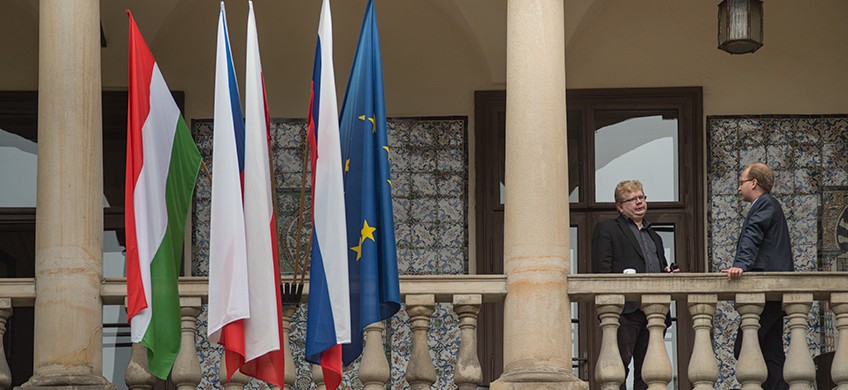
Heading towards the end of the first week of Visegrad Summer School, Thursday was for discussion of the economic perspective of Central Eastern Europe – focusing this time on ethical banking and the economic and social potential of Central and Eastern Europe.
Economy got the floor in Villa Decius on Thursday with the lectures of Wiesław Gumuła and Martin Ehl. First, we got a rather theoretical introduction to the ethical dimensions of the bank sector by Mr. Gumuła, professor at the Jagellonian University, director of the Krakow Regional Branch of Polish National Bank.
Mr. Gumuła built his lecture on the concept of moral cowardice which, according to his thesis makes banks act in an unethical way. In Gumuła’s terms moral cowardice is the natural consequence of “the transformation of reciprocal relations to one direction relations”. This phenomena is more significantly present with big-size commercial banks than with small-size ones – says Gumuła.
After defining the characteristics of ethical banking Mr. Gumuła raised attention to certain processes effecting financial systems in general. Marketization and financialization of society as well as the transformation to “cashless society” are also facilitating this turn from directness to indirectness – which again leads to unethical actions of banks.
From the questions following the lecture it’s worth to highlight Roman Újbányai’s remark. He said alternative ways of banking, like ethical and social banks, are not likely to become dominant due to the natural “selfishness” of people making the vast majority of customers poorly willing to pay more for a financial product just because it’s beneficiary for the society.
Only promises?
“Central-Eastern European countries are far behind the EU average in innovation” – stated Martin Ehl, reasoning the choice of topic of his presentation: showing the potential of our region in exporting innovative ideas – through already existing promising business initiatives.
Firstly, Ehl took the example of Estonia, as a small country yet being able to think globally and export such ideas and business models as Skype. “They are many steps ahead of us in thinking about development “– he added.
“We have a lot of skilled people yet we count rather on low wage work force” – depicted the current situation in all the Visegrad countries Martin Ehl. According to him, the basic reason for such a lagging is the underinvestment into research and development from the companies and the public sector as well.
Going further in detecting the obstacles of CEE countries’ breakthrough in the market of innovations Ehl criticized the state level actors as well who, on one hand, do not have a strategy how and where to put the money in research and development. “After the first wave of investment to infrastructure, which is certainly needed, we lack the view to a second level, that is in which direction to develop further” – said Ehl, referring to the many dead-end streets of regional development in V4 countries.
Eszter Neuberger












